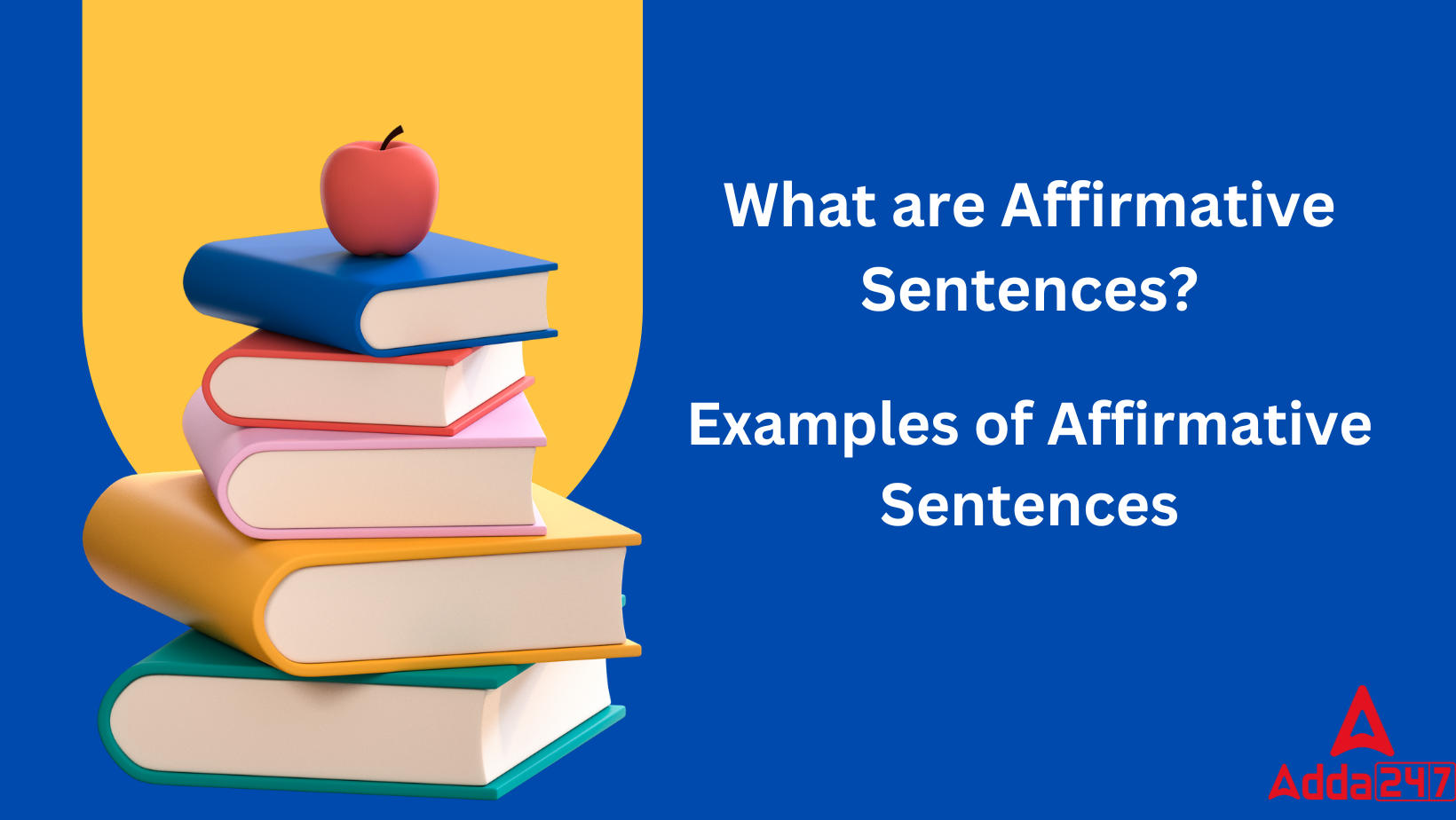Table of Contents
Sentences serve as the building blocks of language and communication, helping to form our ideas, convey them, and enable communication. Affirmative sentences are essential among the various kinds of sentences. When it comes to providing information, stating the obvious, and setting a constructive tone for our conversations, they are the go-to options.
Affirmative Sentence
An affirmative sentence is a pattern of sentences that supports a claim, a regular action, an idea, a request, or random thinking. An affirmative sentence is a positive assertion, to put it another way. An affirmative sentence is one that “states that a fact is so; answers ‘yes’ to a query stated or implied,” according to the Oxford Dictionary of English Grammar. An affirmative phrase is one that “asserts that the fact is so,” according to the Merriam-Webster Dictionary, and the Collins Dictionary defines an affirmative clause as one that “is positive and does not contain a negative term.”
Must learn: Types Of Sentences With Examples, Definition, Exercises, Chart, PDF
What is Affirmative Sentence Meaning?
Affirmative sentences are easy to construct. Another name for an affirmative sentence is a positive sentence. All you have to do is make sure the statement is encouraging. Here is the solution if you’re wondering what an affirmative sentence would look like or what kind of sentence it is. As long as it is positive, an affirmative statement can be declarative or assertive and can be either simple, complicated, or compound. Look at the few examples given below for a better understanding.
Read: Opposite Words- In English And Hindi
Meaning of Affirmative Sentence
The term “affirmative” is an adjective that describes something that is positive, supportive, or confirming. It is often used to indicate agreement, approval, or a positive response to a statement, question, or action. In various contexts, “affirmative” can have different meanings:
- Agreement: When someone responds with an “affirmative,” they are indicating that they agree with or confirm a statement or request. For example, if someone asks, “Are you coming to the party?” and you respond with “Affirmative,” it means you are confirming that you will attend.
- Positive Action: In the context of actions, “affirmative” can mean taking positive or proactive steps to achieve a goal or address an issue. For instance, in a military context, an “affirmative action” might refer to carrying out a planned mission or task.
- Supportive Attitude: “Affirmative” can also describe an attitude or approach that is supportive, optimistic, or constructive. For example, having an “affirmative outlook” means having a positive and hopeful perspective on a situation.
In some cases, especially in formal or legal contexts, “affirmative” may be used as a response to indicate a positive response, while “negative” may be used to indicate a negative response, as in answering yes/no questions or votes.
Overall, “affirmative” conveys a sense of positivity, agreement, or support in various contexts.
Affirmative Sentences Formation in Different Tenses
| TENSE | FORMULA & RULES | EXAMPLE |
| SIMPLE PRESENT TENSE | Subject + base form of the verb/verb+s/es(if needed) + rest of the sentence. | He takes oats for breakfast. |
| SIMPLE PAST TENSE | Subject + past form of the verb (verb 2) + rest of the sentence. | She went for a walk early in the morning. |
| SIMPLE FUTURE TENSE | Subject + helping verb(will) + base form of the verb+ rest of the sentence. | Jeffry will travel around the country in December. |
| PRESENT CONTINUOUS TENSE | Subject + am/is/are + present participle (verb+ing) + the rest of the sentence | I am watching television. |
| PAST CONTINUOUS TENSE | Subject + was/were + present participle (verb+ing) + the rest of the sentence | She was completing her work when her mother came back. |
| FUTURE CONTINUOUS TENSE | Subject + will +be + base form of the verb + the rest of the sentence | Children will be going to school. |
| PRESENT PERFECT TENSE | Subject + have/has + past participle (third form of the verb) + rest of the sentence. | I have worked as an educator for two years. |
| PAST PERFECT TENSE | Subject + had + past participle (third form of the verb) + rest of the sentence. | You had worked as a clerk for five years. |
| FUTURE PERFECT TENSE | Subject + Helping verbs (will + have) + third form of the verb + object. | I will have done this work before she comes. |
| PRESENT PERFECT CONTINUOUS TENSE | Subject + have/has + been + present participle (verb+ing) + since/for (if needed) + the rest of the sentence. | You have been telling truth. |
| PAST PERFECT CONTINUOUS TENSE | Subject + had + been + present participle (verb+ing) + since/for (if needed) + the rest of the sentence. | I had been living at my uncle’s place. |
| FUTURE PERFECT CONTINUOUS TENSE | Subject + will have + been + present participle (verb+ing) + since/for (if needed) + object. | She will have been waiting here for three hours by seven o’clock. |
Affirmative Sentences 10 Examples
Given below are some simple examples of affirmative sentences for a better understanding
- I am reading a book.
- She is our new teacher.
- We generally have dinner at 9 p.m.
- They go to the market daily.
- Seeta is my new friend.
- She likes dancing but her brother likes singing.
- I wore a blue dress.
- They live in a story building.
- My friends are planning a trip to Mumbai.
- She must be sleeping this time.
Some More Affirmative sentence Examples is given below:
- They play cricket.
- I like chocolates a lot.
- Rahul met his school friend unexpectedly.
- As soon as my brother saw me, he hugged me.
- I work as an educator and my brother works as a sketch artist.
Note: All the above sentences are examples of affirmative sentences.
Affirmative Sentence Examples According to the Tenses
| Tenses | Sentences |
| Present Simple | She has a bicycle |
| Present Continuous | He is playing a cricket now |
| Present Perfect | They have been here in an hour. |
| Present Perfect Continuous | I have been staying in this house |
| Past Simple | I visited New Delhi |
| Past Continuous | I was taking lunch. |
| Past Perfect | He had worked hard for this project. |
| Past Perfect Continuous | He had been watching the television continuously |
| Future Simple | I will surely visit your village. |
| Future Continuous | I will be playing voleyball |
| Future Perfect | He will have finished the home work |
| Future Perfect Continuous | We will have been starting the event. |
Affirmative Sentences Exercises
Read the following sentences and check whether these are affirmative or not.
- The new house looks great.
- We were not happy with the new job.
- Millie and kylie are twins.
- The weather reports say that it will not rain today.
- I have twenty boxes of chips left.
- My friend does not like dark chocolate.
- They were not convinced even though we provided them with all the benefits of the proposition.
- My uncle bought me a car for my birthday.
- Kelvin is not working as an educator anymore.
- The teacher taught us how to do unseen passage today.
Check your answers:
- The new house looks great. – Affirmative
- We were not happy with the new job. – Negative
- Millie and kylie are twins. – Affirmative
- The weather reports say that it will not rain today. – Negative
- I have twenty boxes of chips left. – Affirmative
- My friend does not like dark chocolate. – Negative
- They were not convinced even though we provided them with all the benefits of the proposition. – Negative
- My uncle bought me a car for my birthday. – Affirmative
- Kelvin is not working as an educator anymore. – Negative
- The teacher taught us how to do unseen passages today. – Affirmative
Affirmative Sentence Features
- Positive assertions: Positive assertions, which affirm something’s existence or occurrence without contesting it or raising doubts about it, are what define affirmative sentences. As an illustration, the statement “The sun rises in the east” is affirmative.
- Subject-Verb Agreement: The subject and the verb in an affirmative sentence agree on the tense and number of words. Take the sentence “She sings beautifully,” for instance, in which the singular “she” and the third-person singular “sings” coincide.
- Affirmative statements are typically direct and unambiguous, preventing any possibility of misunderstanding or ambiguity. They are a simple way to communicate information.
- Absence of Negative Words: Words that convey negation, such as “not,” “no,” “never,” or others, are rarely found in affirmative sentences. Rather, these sentences support the veracity of a claim.
Affirmative Sentences in Hindi
अंग्रेजी में सकारात्मक वाक्य: एक सकारात्मक वाक्य वाक्यों का एक पैटर्न है जो एक दावे, एक नियमित कार्रवाई, एक विचार, एक अनुरोध या यादृच्छिक सोच का समर्थन करता है। एक सकारात्मक वाक्य एक सकारात्मक अभिकथन है, इसे दूसरे तरीके से रखने के लिए। एक सकारात्मक वाक्य वह है जो “कहता है कि एक तथ्य ऐसा है; ऑक्सफोर्ड डिक्शनरी ऑफ इंग्लिश ग्रामर के अनुसार, एक प्रश्न का उत्तर ‘हां’ में दिया गया है।” एक सकारात्मक वाक्यांश वह है जो मरियम-वेबस्टर डिक्शनरी के अनुसार “जोर देता है कि तथ्य ऐसा है”, और कोलिन्स डिक्शनरी एक सकारात्मक खंड को परिभाषित करता है जो “सकारात्मक है और इसमें नकारात्मक शब्द नहीं है।”
सकारात्मक वाक्य का क्या अर्थ है?
सकारात्मक वाक्य बनाना आसान है। सकारात्मक वाक्य का दूसरा नाम सकारात्मक वाक्य है। आपको केवल यह सुनिश्चित करना है कि कथन उत्साहजनक है। यहाँ समाधान है यदि आप सोच रहे हैं कि एक सकारात्मक वाक्य कैसा दिखेगा या यह किस प्रकार का वाक्य है। जब तक यह सकारात्मक है, एक सकारात्मक कथन घोषणात्मक या मुखर हो सकता है और सरल, जटिल या मिश्रित हो सकता है। बेहतर समझ के लिए नीचे दिए गए कुछ उदाहरणों को देखें।
सकारात्मक वाक्य उदाहरण
उदाहरण:
वे क्रिकेट खेलते हैं।
मुझे चॉकलेट्स बहुत पसंद हैं।
राहुल अपने स्कूल के दोस्त से अप्रत्याशित रूप से मिला।
जैसे ही मेरे भाई ने मुझे देखा, उन्होंने मुझे गले से लगा लिया।
मैं एक शिक्षक के रूप में काम करता हूं और मेरा भाई एक स्केच कलाकार के रूप में काम करता है।
Related Posts:


 Odisha CHSE 12th Date Sheet 2025 OUT, Do...
Odisha CHSE 12th Date Sheet 2025 OUT, Do...
 Odisha CHSE Practical Exam Date 2025 Rel...
Odisha CHSE Practical Exam Date 2025 Rel...
 Bihar Board 12th Sent Up Exam Answer Key...
Bihar Board 12th Sent Up Exam Answer Key...































